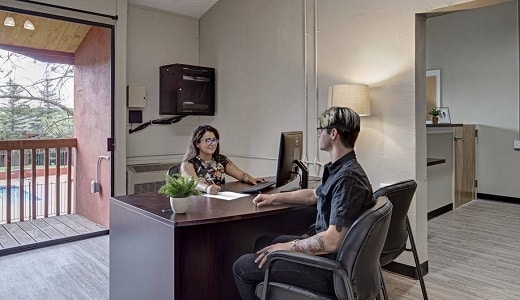
Inpatient Drug Rehab in a Tranquil Setting
Are you looking for inpatient rehab?
Inpatient Drug Rehab
Top rated treatment located within quiet and calming environment.
- Bring Your Phone and Laptop
- Safe 24/7 Monitored Detox
- Dual Diagnosis Programs
- Attentive and Caring Staff
- Thorough Aftercare Planning
Generic Phone Content
 555-555-5555*
555-555-5555*
*HIPPA Compliant and 100% confidential
WE'LL HELP MAXIMIZE YOUR PPO COVERAGE
We will work with your insurance company to get you the best possible coverage and minimize expenses.

Inpatient Drug Rehab
It is important to know what to look for to ensure the best recovery experience possible
A 2015 study commissioned by the National Institute of Alcohol Abuse and Alcoholism (NIAAA) reported that over 23 million adults in the United States have struggled with problematic drug use and that a majority have never received any form of treatment. The prevalence of drug use and lack of treatment is concerning considering the negative impact of substance use disorder (such as salts like Lithium, opioids like Buprenorphine, Opium, and Demerol) disorder on the person affected, his or her family, the community, and society as a whole.
Inpatient drug rehab is one treatment option for those that struggle with substance and alcohol abuse disorders that might be beneficial.
What Is Inpatient Drug Rehab?
Inpatient drug rehab is also called residential treatment. It is a way of treating substance use disorder disorders in which an individual stays at an addiction rehab until the treatment is complete.
When a person goes to this type of rehab, they reside temporarily at the facility for round-the-clock care. Most of the time, treatment will last between 30 and 90 days or more, it will depend on what each person needs for their recovery. Depending on the drug type Depending on the individual Recommended minimum after Rehab
3-7 days
30-90 days
90 - 180 days
What are the Components of Inpatient Rehab?
When looking for inpatient rehab, it can be difficult to know what you’re looking for, and what goes into treatment. However, a greater understanding of the elements of a treatment program can help you to choose the right one for you.
Detox – When your treatment begins, you will likely need to go through a detox. In many cases, when you enter into a residential treatment program, you will be required to have gone through this process. However, many facilities include an on-site detox which helps to streamline the treatment program.
Detoxification (detox), is essential because it is how all traces of substances or alcohol are removed from the system. While it does not make the addiction go away, it does help to ease the physical pain of withdrawal from the source of the addiction. It will require more treatment to gain control over the addiction and begin the recovery process.
Withdrawal management/Medication-assisted treatment – Once the detox process has been completed, it will be time to begin your treatment process. For many, managing the ongoing physical withdrawal symptoms is one of the hardest parts of overcoming an addiction. For this reason, many inpatient rehabs now incorporate medically assisted treatment (MAT), which uses medications to help eliminate the physical cravings and urges that often cause those in recovery to relapse.
Individual and group therapy – When attending residential rehab, another critical aspect of substance or alcohol abuse treatment is the therapy that you will undergo. Therapies help those in recovery begin to understand what addiction does to them, and those around them.
Many different types of therapy help those working to overcome addictions learn to cope with triggers and the pressures of life while avoiding drinking or using substances. Your treatment program will focus on those types of therapy that resonate with you and your needs.
Aftercare – When your stay at an inpatient rehab is complete, your recovery process isn’t over. That’s why a treatment program that includes an aftercare program is so important. In aftercare, many of the same types of treatment, like group and individual therapy are continued, just on a less intense schedule.
This allows you to continue your recovery progress while beginning to re-enter your new life.
Inpatient Rehab Centers Intake Process
 When a person decides to go to residential rehab, they are often afraid of what they don’t know. The intake process can seem terrifying, so knowing what to expect before getting there can make the process less scary.
When a person decides to go to residential rehab, they are often afraid of what they don’t know. The intake process can seem terrifying, so knowing what to expect before getting there can make the process less scary.
The intake process is kind of like checking into treatment. This is when residents meet their doctors and counselors. They will also meet more of the specialists involved in their treatment process. There will be questions on both sides, but residents will be asked about their addiction to help ensure that all treatment needs are met.
It is advisable that those checking into an inpatient treatment program cooperate with the assessments of both their physical and mental conditions. These questions and tests help specialists determine exactly what will be necessary to provide a safe and successful stay in treatment.
Benefits of Inpatient Drug Rehab
Many people don’t like the idea of attending an inpatient drug rehab. For some, it feels like defeat, but that couldn’t be farther from the truth. This type of treatment has been shown to offer significant benefits in the recovery from addiction. Depending on your situation, you may find that this option is more effective than intensive outpatient treatment.
Benefits of attending a residential treatment program include:
- Around-the-clock care: Attending inpatient drug rehab is the best way to ensure that those that need care all day/every day receive it. Residents will have someone to help them through tough moments and healthcare should they need it 24/7. This is a preferred type of treatment for those that have other medical conditions that can be exacerbated by withdrawal symptoms during detoxification (detox).
- Freedom from environmental triggers: Another significant benefit of inpatient rehab is that you will be removed from environmental triggers. or temptations that can make addiction recovery difficult or almost impossible. But, if you enter residential drug rehab, you may find it easier to focus on your treatment and recovery.
- Better treatment outcomes: Inpatient drug rehab care may provide a greater chance for recovery and avoid relapse. The nature of inpatient rehab requires people to actively participate in their recovery which may help them stay in recovery.
Learn More About Your Insurance Coverage
Don't see your Insurance Provider?
Picking an Inpatient Drug Rehab
It can be difficult to choose an inpatient drug rehab since many of these facilities promise to provide excellent results. There are, however, some things to look for that will help ensure the facility is a reputable addiction treatment provider.
Private and Safe Living Environment
Privacy is important in any situation. A residential rehab that ensures privacy and safety is much more likely to provide much-needed downtime that many in recovery seek. Knowing that one is safe is often an essential element to helping those working to overcome substance use disorder disorders continue to make progress in their journey.
Accreditation
In addition to its state license, one of the first things that you need to look for in an inpatient drug rehab center is accreditation. While accreditation by third-party organizations such as the Commission on Accreditation of Rehabilitation Facilities (CARF) and The Joint Commission does not completely guarantee successful outcomes, accreditation is nonetheless a critical indicator of quality.
Evidence-Based Treatment
Effective inpatient drug rehab facilities often use evidence-based treatment approaches that address not only drug addictions but their negative consequences as well. Evidence-based treatment means that the results of research studies support the effectiveness of the treatment methods.
Treatment for Dual Diagnosis
Many things affect addictions. One of these situations is called a dual diagnosis. It occurs when a mental health disorder is combined with addiction. This situation often requires special treatment to ensure that both the mental health issue and the substance use disorder disorder are treated at the same time.
Staff Qualifications
Reputable inpatient drug rehabs are proud to show their staff. They want everyone that visits to know that they hire well-qualified people to work with those in treatment. Pictures, bios, and qualifications make it easy to determine if the staff at a facility has been properly trained in addiction treatment.
Traveling for Inpatient Drug Rehab
 While some may not want to go far from home when attending inpatient drug rehab, others feel that a dramatic change will be just what they need to get started living a healthy, addiction-free lifestyle.
While some may not want to go far from home when attending inpatient drug rehab, others feel that a dramatic change will be just what they need to get started living a healthy, addiction-free lifestyle.
The choice almost always depends on the person choosing to get treatment for their substance use disorder disorder, and will likely rely heavily on whether or not a facility offers treatment models that they need. Traveling to attend residential rehab is not usual, and many who do find that they can start fresh in their new place when treatment is complete.
Those who do choose to travel for addiction treatment should consider whether they will be able to stay for additional treatment that might include aftercare and staying in a sober living facility for a time.
Inpatient Drug Rehab Could Offer the Help You Need
While many people shy away from the idea of residing in an addiction treatment facility for 30 to 90 days, research shows that it can be a very effective way to start overcoming a substance or alcohol abuse disorder.
For those that are struggling, and have found that other types of treatment didn’t offer enough support, residential rehab might be the logical next step in the search for an effective recovery program.
Find an Addiction Treatment Resource in Your Home State
Sources
Medical disclaimer:
Sunshine Behavioral Health strives to help people who are facing substance abuse, addiction, mental health disorders, or a combination of these conditions. It does this by providing compassionate care and evidence-based content that addresses health, treatment, and recovery.
Licensed medical professionals review material we publish on our site. The material is not a substitute for qualified medical diagnoses, treatment, or advice. It should not be used to replace the suggestions of your personal physician or other health care professionals.













